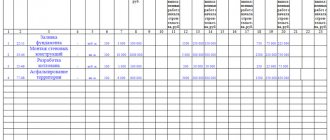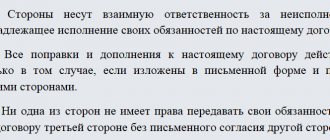Article 198. Student agreement
An employer - a legal entity (organization) has the right to conclude with a job seeker an apprenticeship contract for vocational training, and with an employee of this organization - an apprenticeship agreement for vocational training or retraining on-the-job or off-the-job.
(as amended by Federal Law No. 90-FZ of June 30, 2006)
A student contract with an employee of this organization is additional to the employment contract.
(as amended by Federal Law No. 90-FZ of June 30, 2006)
When make up
The organization will offer you to enter into an apprenticeship agreement to train an employee with an employer or a third-party educational organization if you:
- hired (work) under an employment contract and undergo training or retraining with or without interruption from work;
- You will be trained in a specific specialty for the purpose of further work at the enterprise.
An apprenticeship agreement is concluded with the employer both directly upon hiring in the organization and during the work process:
- in the first case, an employment agreement will be concluded with you and it will become additional to the employment contract (Part 2 of Article 198 of the Labor Code of the Russian Federation);
- in the second, it will be a student agreement without an employment contract - civil law content.
If you work or get a job at a large enterprise, it is useful to know that the conditions and procedure for obtaining education are usually enshrined in a collective agreement (agreements, employment contract) (Part 2 of Article 196 of the Labor Code of the Russian Federation). In this case, the employer, when choosing forms of training for employees and compiling a list of required professions and specialties, takes into account the opinion of the trade union (Part 3 of Article 196 of the Labor Code of the Russian Federation). The procedure for taking into account the opinion of the trade union is established by Article 372 of the Labor Code of the Russian Federation.
Article 199. Contents of the student agreement
The student agreement must contain: names of the parties; an indication of a specific profession, specialty, qualification acquired by the student; the employer’s obligation to provide the employee with the opportunity to study in accordance with the apprenticeship contract; the employee’s obligation to undergo training and, in accordance with the acquired profession, specialty, qualification, to work under an employment contract with the employer for the period established in the apprenticeship contract; duration of apprenticeship; amount of payment during the apprenticeship period.
The student agreement may contain other conditions determined by agreement of the parties.
Standard form of an apprenticeship agreement with an employee according to the Labor Code of the Russian Federation
A standard sample student document on study leave contains a certain procedure for registration and features of provision, which are regulated by the labor legislation of the Russian Federation. There are necessary grounds and conditions for concluding it, such as:
- employer interest and employee initiative to conduct vocational training;
- study time should not exceed the established standard working time;
- in addition to paid training, the manager is obliged to pay a stipend not lower than the minimum wage, which is established by the Federal Law of the Russian Federation;
- indication of the terms of work after study;
- establishing the grounds for termination of legal relations, as well as the specifics of termination;
- an indication of the reasons why the money is being reimbursed to the organization.
The standard form contains personal information about the employee and employer, the rights and obligations of the parties to the document, as well as the specific validity period of this agreement.
Is it possible to conclude a student agreement without an employment contract in 2018?
The main difficulties that arise during the preparation of this document are the question of the student’s labor status. Many employers doubt whether it is worth formalizing a working relationship along with an educational one. In the Labor Code, the concept of a training agreement does not refer to a work contract, therefore this type of document is of a mixed nature. This document is additional, so you need to conclude a basic standard work agreement.
Article 201. Validity of the student agreement
The student agreement is valid from the date specified in this agreement for the period stipulated by it.
The validity of the student agreement is extended for the duration of the student’s illness, military training, and in other cases provided for by federal laws and other regulatory legal acts of the Russian Federation.
(as amended by Federal Law No. 90-FZ of June 30, 2006)
During the validity period of the student agreement, its content can be changed only by agreement of the parties.
What to look for in a student agreement
1. Include in the document all the mandatory conditions from Art. 199 TK. Among them: an indication of the qualifications that the employee will receive, the duration of the apprenticeship and the amount of payment during this period.
2. Add one more clause to the contract if you plan to train an employee for a profession that requires a mandatory medical examination. Indicate that the contract can be concluded only after the provision of medical documents confirming that the employee is fit to work for health reasons. Also, in order to inform the employee about this, state that the medical examination is paid for by the company. She is obliged to do this regardless of the presence of this condition in the contract.
Sample. Student agreement
3. Document the employee's responsibilities during and after training. Indicate the need to attend class or report reasons for absence, as well as the consequences of missing class. The employee must not only study for a certain time, but also successfully complete the training and receive a document of the established form. For example, a diploma of professional retraining. Also decide what will happen if the employee is expelled, refuses to take the final exam or work in the company after training.
4. Determine how long the employee will have to work in the company after receiving the diploma. There is no maximum period of service in the law. Usually indicate 3–5 years. It is not worth setting a period that is too long, for example 20 years. In such a situation, upon dismissal, even after 5 years of service, the employee will have to return 75% of the cost of training. This violates the principle of freedom of labor and indicates an abuse of rights on the part of the employer.
5. Do not indicate that the employee, upon early dismissal, will have to reimburse the company for training costs in full. This condition is contrary to Art. 249 of the Labor Code and worsens the situation of the employee. The amount of payment to the company depends on the length of time worked after studying (appeal ruling of the Krasnoyarsk Regional Court dated July 10, 2017 in case No. 33-8930/2017).
Sample. Student agreement (continued)
6. Establish the possibility of recovering travel expenses if training takes place in another location. Judicial practice is contradictory. Some courts believe that it is impossible to recover travel expenses, since they are not direct costs of training (appeal ruling of the Orenburg Regional Court dated October 21, 2015 No. 33-7152/2015). The other part is that the employee must reimburse the costs of the business trip, since it is related to the apprenticeship (appeal rulings of the Sverdlovsk Regional Court dated April 22, 2015 No. 33-5254/2015, Krasnoyarsk Regional Court dated June 28, 2017 in case No. 33-6940/2017) . The provision of the student agreement on the possibility of collecting travel expenses will be an additional argument in favor of the employer. It confirms that the employee has agreed to reimbursement of these expenses, for example, in case of early dismissal.
7. List in which cases the employee will have to reimburse the employer for the expenses that he incurred in connection with the apprenticeship. Also identify valid reasons for early dismissal or expulsion from the educational institution that will exempt the employee from reimbursement. There is no list of such circumstances in the law. Therefore, the employer himself decides which reasons are valid (letter of the Ministry of Labor dated October 18, 2017 No. 14-2/B-935). To avoid disputes, write them down in the student agreement (letter of Rostrud dated October 18, 2013 No. 852-6-1).
Sample. Student agreement (continued)
8. If education is a condition for performing work, then it is impossible to recover money from the employee. For example, at its own expense, the employer provides mandatory training for doctors, teachers and government civil servants (Part 4 of Article 196 of the Labor Code, Clause 8 of Part 1 of Article 79 of the Federal Law of November 21, 2011 No. 323-FZ, Part 5 of Art. 47 of the Federal Law of December 29, 2012 No. 273-FZ, Part 5 of Article 62 of the Federal Law of July 27, 2004 No. 79-FZ). Thus, a doctor can work as a therapist only if he has the appropriate certificate. If its validity expires, it is the employer's responsibility to send the employee to courses to obtain a new certificate. It is impossible to recover money for training from a physician in this situation (appeal ruling of the St. Petersburg City Court dated May 11, 2017 in case No. 2-1087/2017).
Article 203. Time of apprenticeship
The apprenticeship time during the week should not exceed the standard working time established for workers of the appropriate age, profession, specialty when performing the relevant work.
Employees undergoing training in the organization, by agreement with the employer, can be completely released from work under an employment contract or perform this work on a part-time basis.
During the period of validity of the apprenticeship contract, employees cannot be involved in overtime work or sent on business trips not related to the apprenticeship.
Student agreement with an employee to receive education without interruption from work
When needed: if the organization sends an employee to train in the required specialty (qualification). At the same time, the employee continues to perform his work duties.
Completed sample
STUDY AGREEMENT No. 12-U for obtaining education without interruption from work1,2
| Moscow | 14.09.20163 |
“Alpha”, hereinafter referred to as the “Employer”, represented by the director Alexander Vladimirovich Lvov, acting on the basis of the Charter, on the one hand, and Alexander Ignatievich Ivanov, hereinafter referred to as the “Employee”, on the other hand, have entered into this agreement as follows.4
1. The Subject of the Agreement5
1.1. Due to the Employer’s need for an employee qualified as a “specialist”6, performing work in the specialty “landscape design”, the Employer sends the Employee to receive education in the specialty while maintaining his previous place of work.
1.2. The employee is sent to study at the educational institution “Academic School of Design” (license of the Moscow Committee of Education No. 012299, issued on July 12, 2012) to take a course in the “landscape design” program.
1.3. Duration of education is four months.7
1.4. The form of training is full-time and part-time.
1.5. The employee is sent to study without interruption from work. In this case, the Employee performs work on a part-time basis.8
1.6. Upon completion of training, the Employee receives a specialty in landscape design and is transferred to the position of landscape designer.
2. Rights and Obligations of the parties
2.1. The employer is obliged:9
- provide the Employee with the opportunity to study in accordance with the terms of this agreement;
- conclude with the educational institution specified in clause 1.2. of this agreement, an agreement for the provision of educational services;
- retain for the Employee the place of work he occupied with the Employer until the conclusion of this agreement;
- pay tuition fees on time in accordance with the terms of the agreement concluded with the educational institution;
- draw up the Employee’s work schedule in such a way that the Employee does not miss training sessions;
- organize an internship for the Employee and provide assistance in selecting materials for completing tests, coursework and other assignments;10
- provide the Employee with paid study leave in the manner established by Article 173 of the Labor Code of the Russian Federation;
- compensate the Employee for all expenses incurred when purchasing educational literature, as well as transportation costs;
- upon successful completion of the educational process, transfer the Employee to the position of landscape designer.
2.2. The employer has the right:
- monitor the Employee’s progress during the training process;
- require the Employee to submit all documents confirming his additional expenses for study (checks, receipts confirming expenses for books, textbooks, travel tickets, etc.).
2.3. During the period of validity of this agreement, the Employer has no right to involve the Employee in overtime work or send him on business trips not related to apprenticeship.
2.4. The employee is obliged:
- carry out the curriculum (in accordance with Appendix 1 to this agreement), comply with academic discipline, obtain a certificate of completion of an educational institution;
- submit, at the request of the Employer, the necessary documents on academic performance (grade book, certificates, etc.);
- after receiving a certificate of completion of an educational institution, work for at least three years with the Employer;11
- in his free time from study, perform work in the position occupied by the Employee before the conclusion of this agreement;
- reimburse funds transferred by the Employer to pay for training, including funds received as a scholarship, for the entire duration of training, in the following cases:
- dismissal of the Employee at his own request without good reason before the expiration of the period of training and compulsory work established by this agreement, as well as violation of labor discipline, commission of other guilty actions for which the law provides for dismissal from work;
- expulsion of the Employee at the initiative of the educational institution for academic failure, violation of academic discipline, labor regulations of the educational institution;
- expulsion of the Employee from the educational institution at his own request without good reason.
If the Employee is dismissed at his own request without good reason before the expiration of the period of compulsory work established by this agreement, reimbursement of the Employer's expenses for training is made in proportion to the time actually not worked after completion of training.
2.5. An employee has the right not to report to work during school hours if they fall during working hours.
3. Conditions of payment and study
3.1. During the training period, the Employee is paid a monthly salary for the time actually worked based on the salary amount established by employment contract No. 18-TD dated January 15, 2014.
3.2. In addition to wages, during the training period the Employee is paid a monthly stipend in the amount of 7,000 (Seven thousand) rubles.12
4. Responsibility of the parties
4.1. If the parties fail to fulfill or improperly fulfill their obligations assumed in accordance with this agreement, the parties bear responsibility in accordance with the Labor Code of the Russian Federation (Articles 207 and 249 of the Labor Code of the Russian Federation) and other legislation of the Russian Federation.
5. Conditions for termination of the contract
5.1. This agreement is terminated on the grounds provided for termination of employment contract No. 18-TD dated January 15, 2014.
6. Final provisions13
6.1. This agreement has been drawn up in two copies, one for each party. Both copies have the same legal force.
6.2. This agreement is additional to employment contract No. 18-TD dated January 15, 2014.
6.3. This agreement comes into force from the moment it is signed and is valid until the end of training, the duration of which is provided for in clause 1.3 of this agreement.
6.4. Disputes arising under this agreement are resolved through negotiations. If agreement is not reached, disputes are resolved in court.
6.5. The validity of this agreement is extended for the duration of the Employee’s illness, as well as in other cases provided for by the Labor Code of the Russian Federation and other current legislation of the Russian Federation.
6.6. Issues not regulated by this agreement are resolved in the manner prescribed by current legislation.
7. Addresses and details of the parties
| Employer: "Alpha" Address: 125008, Moscow, st. Mikhalkovskaya, 20. TIN 7708123456, checkpoint 770801001 account 40702810400000001111 in JSCB “Nadezhny”, account 30101810400000000222, BIC 044583222 | Worker: Ivanov Alexander Ignatievich Passport series 46 02 No. 545177 issued by: Department of Internal Affairs of the Voskresensky District of the Moscow Region on April 15, 2002 Registered: 125373, Moscow, blvd. Yana Rainisa, 24, bldg. 2, apt. 474 |
8. Signatures of the parties
| Employer | Worker |
| Director ______________ A.V. Lviv | ______________ A.I. Ivanov14 |
| M.P. |
r />
1 The apprenticeship contract is additional to the employment contract and does not replace it (Article 198 of the Labor Code of the Russian Federation).
2 The student agreement is concluded in writing in two copies (Article 200 of the Labor Code of the Russian Federation).
3The student agreement is valid from the date specified in it (Article 201 of the Labor Code of the Russian Federation).
4 The student is subject to labor legislation (Article 205 of the Labor Code of the Russian Federation).
5 The mandatory conditions of the apprenticeship contract are provided for in Article 199 of the Labor Code of the Russian Federation.
6 Indicate the qualifications that the student acquires (Article 199 of the Labor Code of the Russian Federation).
7 Indicate the duration of training (Article 200 of the Labor Code of the Russian Federation).
8 Training time during the week should not exceed the standard working time for the corresponding age, profession, specialty (Article 203 of the Labor Code of the Russian Federation).
9 The terms of the student agreement must not contradict the Labor Code of the Russian Federation, collective agreements, labor agreements (Article 206 of the Labor Code of the Russian Federation).
10 The student agreement may contain additional conditions determined by agreement of the parties (Article 199 of the Labor Code of the Russian Federation).
11 Specify in the contract the period during which the employee will have to work after completing training (Article 199 of the Labor Code of the Russian Federation).
12 Set the scholarship no lower than the minimum wage (Article 204 of the Labor Code of the Russian Federation).
13 In the “Final Provisions” section, indicate the procedure for resolving possible labor disputes and disagreements between the employer and employee.
14 The document must contain a transcript of the signature (GOST R 6.30-2003).
Article 207. Rights and obligations of apprentices upon completion of apprenticeship
For persons who have successfully completed an apprenticeship, when concluding an employment contract with the employer under whose contract they were trained, a probationary period is not established.
If the apprentice, at the end of the apprenticeship, without good reason, does not fulfill his obligations under the contract, including not starting work, he, at the request of the employer, returns the scholarship received during the apprenticeship, and also reimburses other expenses incurred by the employer in connection with the apprenticeship.
Sample student agreement between employee and employer
This document must contain information about the purpose. The purpose of the conclusion may be advanced training, pre-training or professional study, in connection with which there is release from work or the absence of study leave. The sample must contain the following:
- the name of the company and the initials of the employee, as well as their responsibilities;
- specialty received;
- cash payments to the employee during his studies;
- mutual agreement to change the terms specified in the document;
- validity.
This document must be concluded in a standard form, a sample of which is fixed by law in the Labor Code of the Russian Federation.
Student Responsibilities
The contract should indicate the student's responsibilities. He must:
- attend classes at an educational institution;
- study hard. If a contract is concluded with an applicant, this is especially important: good grades will increase the chances of employment;
- complete assignments within the curriculum;
- pass assigned certifications;
- present to the employer the received educational documents, etc.
This is important to know: Work 2 through 2 under an employment contract: sample 2020
Please note that the employer has the right to monitor the student’s progress.
Termination of a student contract at the initiative of the employee
Termination of educational relations is possible after completion of studies or for the reasons specified in Article 208 of the Labor Code of the Russian Federation.
Termination of a document at the initiative of an employee of the organization is possible in the event of dismissal of his own free will; the reason for this may be any circumstances due to which the employee cannot continue to work
It is important to remember that the reasons must be objective in order to formalize this procedure
This termination at the initiative of the employee allows you to leave without compensation payments for professional training.
In your resignation letter, it is important to indicate compelling circumstances and attach evidence, if any.
Reimbursement of funds under the student agreement
Reimbursement of money that was allocated for training to an employee by mutual agreement of the participants in the working relationship is possible only if certain rules and conditions that are included in the training agreement are violated.
Therefore, an employee must compensate for the company’s expenses only on the initiative of voluntary training at the expense of the employer. With compulsory training, all monetary costs are paid from the enterprise budget free of charge. In case of advanced training, according to Article 249 of the Labor Code of the Russian Federation, reimbursement of money to the enterprise is not provided.
Internship agreement
No. 1154;
Regulations on industrial (professional) practice of students, cadets of educational institutions of secondary vocational education, approved by the Ministry of Education of the Russian Federation on July 21, 1999 https://www.youtube.com/watch{q}v=6xafKeIX2u0
The opposite situation is possible: a student finds an organization where he wants to do an internship and contacts the university to document his choice. In this case, the institute needs to contact the company to sign the agreement.
As a rule, universities have their own sample contract for practical training.
The answer depends on the agreements reached with the university and the nature of the training cycle.
Moreover, each educational institution has the right to independently develop documents regulating the organization of practical training for students, taking into account the specifics of training specialists. There are various options for undergoing practical training: If a trainee is hired by an organization for a vacant position, he or she begins an employment relationship with the host organization. This is permissible in accordance with paragraph 10 of the Regulations.
Let's talk about this type of practice in more detail. So, the educational institution has entered into an agreement with your organization on student internship.
Is it possible to conclude an employment contract with a trainee{q}
The educational standard provides for two types of practice: educational (introductory) and production.
If an employer annually hires a significant number of trainees, it makes more sense to introduce appropriate positions for them. In the electronic version of the article you will find an additional sample: an additional agreement to the employment contract on additional payment for managing a practice.
In turn, a student undergoing an internship at an enterprise is required to follow the internal labor regulations approved by the employer, comply with labor safety requirements and obey the provisions of local regulations of the organization***.
The internship agreement includes a standard set of information: ** Optional clauses - are entered at the discretion of the enterprise.
We will accept for internship persons who are not in an employment relationship with the employer, possibly in one of the following ways: A student can be accepted for an internship in two ways: • by referral from an educational organization for practical training (clause.
24 hours 1 tbsp. 34 of the Law of December 29, 2012
No. 273-FZ); • at the initiative of an organization that independently recruits students for internships (without contracts with educational institutions). Issues related to organizing internships for students of higher educational institutions are regulated by the Regulations on the procedure for conducting internships for students of educational institutions of higher professional education, approved by the approved order of the Ministry of Education and Science of Russia dated November 27, 2020.
No. 1383. Thus, the conclusion of an employment contract with
A student agreement, like any other, is concluded
With the introduction of the Labor Code, companies at the legislative level were given the opportunity to train personnel for their own needs using external specialists or on their own.
The opportunity to minimize the risk of losing personnel after training and legally secure the fact of investing money in a specific employee is realized with the help of an apprenticeship agreement.
The article reveals the features of concluding various types of student agreements and discusses the practice of their application.
During the Soviet economy, there was no particular need for a student agreement. The centralized solution of all issues has created a coherent system of personnel training for enterprises and organizations.
This was a system of approved plans for the recruitment of applicants, their subsequent distribution among enterprises, and the training of young specialists by mentors, which was implemented through the relevant educational institutions and training teams.
With the advent of new times, public education began to lag far behind the needs of enterprises, and companies independently began to resolve the issue of developing and training their employees.
On the one hand, the company needed qualified specialists, on the other hand, the risks increased that employees would quit after training. In order to protect the material interests of the employer, in 2001
The Labor Code of the Russian Federation has a whole chapter dedicated to the apprenticeship agreement. It was improved in 2006, and therefore is still in demand by employers.
https://www.youtube.com/watch{q}v=UVqBPIZTyus
At the same time, practice shows that many colleagues incorrectly use this type of agreement, so let’s take a closer look at this tool.
Types of contracts
To begin with, let’s define that an apprenticeship contract is drawn up for the purpose of training or retraining a specialist that the enterprise needs.
– for vocational training with a job seeker;
– with an employee of this organization for retraining on the job or without interruption from work.
In fact, these are two different agreements governing two types of relations.
Thus, an apprenticeship agreement with a job seeker is of a civil law nature, and an apprenticeship agreement with an employee of a given organization for retraining on-the-job or off-the-job is an addition to the employment contract.
An analysis of judicial practice shows that employers enter into both an additional apprenticeship agreement and an addition to the employment contract. We note that regardless of the form, such a document must contain all the necessary conditions provided for by the Labor Code of the Russian Federation.
An apprenticeship agreement with a job seeker is in many ways similar in content to an apprenticeship agreement with an employee of a given organization for vocational training. Its main difference is that there are no labor relations between the parties to the transaction at the time of its conclusion.
Both of these agreements are concluded with the employer, which is a legal entity, and only for training conducted by the employer himself.
Therefore, you should not conclude a student agreement, but a training agreement at the expense of the employer.
For your information. The logic of experts, in particular Yu. P. Orlov, is based on three “pillars” - the historical development of the concept of “apprenticeship agreement”, the definition of the parties to the agreement and the sectoral nature of the apprenticeship agreement itself.
In the first case, the apprenticeship contract, even in Soviet labor legislation, was considered as the basis for the emergence of legal relations for vocational training or retraining carried out directly at work.
In the second case, the parties to the apprenticeship agreement are the employer - an individual - entrepreneur or legal entity and the student - an individual (employee or job seeker), as expressly stated in Art. Art. 198 and 199 of the Labor Code of the Russian Federation.
And thirdly, which causes the greatest controversy among specialists, the nature of the student agreement itself is based on labor relations and contradicts civil law norms.
However, initially, in the first edition of the Labor Code of the Russian Federation, the student agreement was considered as a civil contract, regulated by civil legislation and other acts containing civil law norms.
We invite you to read: Criminal liability for fraud and fictitious registration
According to the St. Petersburg School of Law, in particular S.P. Mavrin, the difference between an apprenticeship agreement and a civil law agreement for the provision of paid services lies primarily in different purposes.
The purpose of the apprenticeship contract pursued by the employer is to train personnel for production.
https://www.youtube.com/watch{q}v=YIr8zBfKE50
Under an apprenticeship agreement, the employer independently determines the need for professional training for its own needs, organizes training at its own expense and pays a stipend to the apprentice.
That is, it is not the student who orders and pays for training, which would be typical for civil law relations. The result of training is not the service provided, but the labor relationship that subsequently arises, which is why experts define the nature of the student agreement as an agreement within the scope of labor law.
In practice, employers often enter into two contracts: one with the organization that trains the employee, and the other with the employee who will study at this institution.
We also note that, despite experts classifying contracts between an employer and a student with the involvement of a training organization as other types of contracts than an apprenticeship, in law enforcement practice the courts classify such types of agreements as apprenticeships and apply labor legislation. At the same time, if a third-party organization is involved, it is more correct to conclude with the employee not a student agreement, but an additional agreement to the employment contract, specifying all the necessary conditions in it.
How to draw up and main provisions
The terms of the contract concluded with a person who is looking for work differ from the conditions provided for an employee of the institution.
The document is drawn up in writing in 2 copies (Part 2 of Article 200 of the Labor Code of the Russian Federation of the Labor Code of the Russian Federation). Once signed by an employee, it becomes additional to the labor document. It is also recommended to obtain the employee’s signature on confirmation of receipt of the second copy in hand (Part 1 of Article 67 of the Labor Code of the Russian Federation). The same recommendation applies to agreements with applicants.
There is no established form, so you can develop it yourself, for example, an apprenticeship agreement with an employee of an enterprise (sample 2020 with work), which is given below.
The content of such a document is defined in Art. 199 Labor Code of the Russian Federation. It should include:
- details of the parties (name of the institution, full name of the head, the grounds on which he represents the organization (regulations, charter, etc.), full name of the student or applicant;
- qualifications for the acquisition of which a person will undergo training (it is recommended to choose according to ETKS, a directory of positions approved by Resolution of the Ministry of Labor No. 37 of August 21, 1998, professional standards (Article 195.1 of the Labor Code of the Russian Federation));
- information that the employer is obliged to provide the employee with the opportunity to study in accordance with the stipulated provisions (for example, releasing the student from work during the training period);
- a condition obliging the employee not only to complete the training course, but also to work for the period specified in the agreement with the employer who sent her;
- period of being in the “student” status (depending on the type of qualification acquired);
- payment provisions (i.e. scholarship amount, student wages).
This is important to know: At what age, as a general rule, is it permissible to conclude an employment contract?
Such a document can include other conditions on which the parties have reached agreement:
- the possibility of transferring an employee to another job upon completion of the training course;
- the amount and procedure for payment for studies (can be paid at the expense of the employer or partially from the student’s funds);
- the amount of compensation for the employer's losses associated with training in the event of the student's dismissal for reasons provided for in the agreement (a sample student agreement with reimbursement of training costs is given below);
- renewal;
- final exam schedule;
- additional guarantees for the employee (vacation, travel payment, etc.).
After conclusion, the document is subject to change if there is an agreement between the parties (Part 3 of Article 201 of the Labor Code of the Russian Federation), which is drawn up as an additional agreement to the student agreement in 2 copies (for each of the parties).
There is no need for the employer to issue an order for training upon conclusion of the contract. However, in order to correctly take into account the time of study, you can publish such a document, indicating in it information about your full name. parties to the agreement, term, payment information, working hours, etc.









